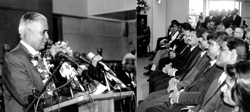
Provincial Appeal Court opens in KandyPresident of the High Court Judges Association and Kandy High Court Judge D.S.C. Lekamwasam addressing the gathering at the opening of the Central Provincial Appellate Courts said that the country would be grateful to the Chief Justice for setting up the first such court in the Central Province. Tracing the historical significance of this exercise the High Court Judge said with the failure to secure the required two thirds majority to amend the Constitution for the purpose of setting up of the Provincial Appellate Courts, the Chief Justice was not deterred from setting up these courts.
He said Chief Justice Sarath N. Silva, during a visit to China had thought that by strengthening the present High Courts, civil matters also could be decided. The High Court Judge further said that this exercise would not only be useful to the lawyers, but to the common man too. He also said he would like to draw the attention of the Ministry officials to the lack of the basic need of a good library for the lawyers and others engaged in the practice. He said that this aspect should be looked into to further enhance the targets that had been set by the Chief Justice. The Additional Secretary to the Ministry of Justice (Legal) Sisira K. Ratnayake said according to the Constitution of Sri Lanka the hearing of a Court of Appeal of all cases were confined to 12 members of the Judiciary in Colombo. With this situation, more and more cases came into the Appeal Court and these numbers could not be controlled. He said that according to the available records in the Courts, during the past decade, in 1995 there were 493 cases and in 2000 1185. In 2005 it was 1566. In this context, various avenues were resorted to bring down the growing number of cases in the Appeal Court. He said that in this respect, an amendment was scheduled to be made to the 18th Amendment both in 2004 and 2005 and to bring the strength of the Judiciary to 21. But, Parliament should have a two thirds majority for these amendments and this could not be made. The Chief Justice who was determined to see that there should be service to the common masses who come to the Judiciary decided that since there is already power vested in the High Court for Criminal offences, he decided to give power to the High Courts for Civil matters as well. He said similar Courts would be set up in Colombo, Gampaha, Kalutara, Galle, Ratnapura, Kegalle, Kuruegala, Anuradhpaura, Trincomalee, Jaffna and Badulla. The Presdient of the Kandy Bar Kithsiri Seneviratne, addressing the gathering of lawyers and the Judiciary said this was a historic occasion since it would change the judicial system of the country. This prevents the litigants from having to go to Colombo to seek justice. He said that the Chief Justice took remedial measures to clear nearly 15,000 cases from the Court of Appeal. He said that on this historic occasion it would be good to remember that history repeats in a spot where the famous battle of Gannoruwa was fought in Senkadagalapura on which site this palladium of justice is built. Tracing back the history, he said that it is not long after the Kandyan Convention was signed it was left to Lt. General Robert Brownrigg to abolish the two divisions of the Supreme Court and establish a Provincial Court at Kalpitiya and all judicial matters were placed under a Judicial Committee. The Jurisprudence of the country known as "Maha Nadu" ceased to function thereafter. It was Governor Maitland around 185 years ago who set up five Provincial Courts for Civil and Criminal Jurisdiction. Before the opening of the Central Provincial Appellate Court the Chief Justice and other distinguished members of the Bench and Bar were conducted in procession by Kandyan dancers. |
| || Front
Page | News
| Editorial
| Columns
| Sports
| Plus
| Financial
Times | International | Mirror
| TV
Times | Funday
Times | Kandy
Times || |
| |
Copyright
2007 Wijeya
Newspapers Ltd.Colombo. Sri Lanka. |
